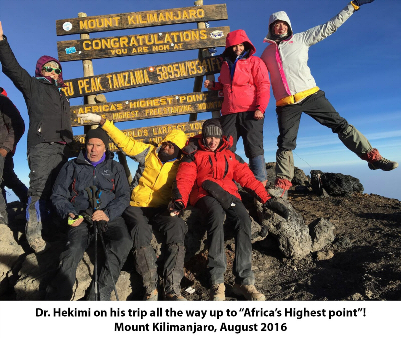Brief Biography

Siegfried Hekimi was born in Zürich and obtained his undergraduate degree in Biology at the University of Geneva. He did not immediately pursue graduate studies but instead engaged in a full-time career as a cyclist (click here to see photos), first as a member of the amateur Swiss National Team and then as a professional in various teams in Switzerland and Italy. He was selected for the World Championships four times and participated in such well known races as the Tour de France and the Giro d'Italia. After this adventure he completed a PhD in Neurobiology in 1988 with Professor Michael O'Shea, again at the University of Geneva. His thesis focused on the biosynthesis of neuropeptides, which was poorly understood at the time.
It was to tackle this problem that he first developed an interest in using invertebrate models to study evolutionarily conserved processes. This approach led him to study the cardiac bodies of locusts, a pair of endocrine glands almost completely dedicated to the production of the peptidic adipokinetic hormones. He then moved to the famed Laboratory of Molecular Biology (LMB) of the Medical Research Council in Cambridge, UK, to collaborate with Dr J.G. White as a post-doctoral fellow of the Swiss National Science Fund. It is at the LMB that Sydney Brenner developed the nematode Caenorhabditis elegans as one of the premier research tools in genetics, and where Hekimi developed his interest for using 'the worm' for translational studies in the biology of aging. It is also in Cambridge that he identified the first mutants that helped to demonstrate that aging could be manipulated genetically and that inducing mild mitochondrial dysfunction could in fact slow down the aging process of animals. After three years in Cambridge, Hekimi joined the Department of Biology at McGill University.
He became a Canadian and remained at McGill where he has been a full professor since 2004. He has continued his research on the aging process, extending his reach to include mouse models of aging and of age-dependent diseases, as well as drug discovery through the medium of a spin-off company, Chronogen, which closed in 2007 when its assets were acquired by larger entities. His research at McGill University has been principally funded by the Canadian Institute of Health Research and the Canadian Fund for Innovation, and also by the National Science and Engineering Council, by the Canadian Cancer Society Research Institute, industrial partners, and McGill University.
He holds the Robert Archibald & Catherine Louise Campbell Chair in Developmental Biology. In 2010 he became a Fellow of the Royal Society of Canada and two years later was awarded the Flavelle Medal of the RSC for outstanding contribution to biological science. He is also a science popularizer who is regularly interviewed by radio and television broadcasters and the written press to explain the significance of new findings in the field of biology of aging, including his own, for human aging and human health.
Recent Invited Lectures and Seminars
Fixing Ubiquinone Deficiency. British Columbia Children’s Hospital Research Institute, January 2021.
Fixing Ubiquinone Deficiency. Endocrine Unit. McGill University Health Center. Montreal, March 2020.
Making Ubiquinone Bioavailable. Department of Biochemistry and Molecular Pharmacology, NYU. December 2019.
Making Ubiquinone Bioavailable. The Mitochondrial Biogenesis and Dynamics in Health and Disease Conference. Palm Springs, June 2019.
Oxidation of Proteins during Aging: Damage or Signaling? Protein Function and Malfunction Meeting. University of Saskatchewan. June 2019.
Making Ubiquinone Bioavailable. 9th Conference of the International Coenzyme Q10 Association. Columbia University, New York. June 2018.
Mitochondrial dysfunction and ROS signaling in the aging process. FASEB symposium on Mitochondrial Biogenesis. West Palm Beach, Florida. May 2017.
Neither mitochondrial dysfunction or
reactive oxygen species cause aging. Lady Davis Research Institute, April 2017; Invited by the graduate students.
Neither mitochondrial dysfunction nor reactive oxygen species cause aging.
Université du Québec à Montréal, March 2017.
We don’t understand the aging process.
University Medical Center Groningen, November 2016.
Mitochondrial dysfunction and animal lifespan: untangling the knot.
CECAD Research Center Seminar Series, University of Cologne, June 2016.
Mitochondrial dysfunction and animal lifespan: untangling the knot.
ISANH Antioxidants World Congress. Institut Pasteur, June 2016.
Mitochondrial dysfunction and animal lifespan: untangling the knot. Centre Hospitalier de l’Université de Montréal. Institute de research sur le Diabete. April 2016.
No Evidence that Mitochondrial Dysfunction Causes Animal Aging. Keystone meeting on Mitochondrial Dynamics in Steamboat Springs. April 2016.
Mitochondrial dysfunction and longevity in animals. 6th Annual Alliance for Healthy Aging Conference. Newcastle, UK, October 2015.
Mitochondrial dysfunction and longevity in animals: untangling the knot. Institute of Stem Cell Research. U. of Minnesota. Minneapolis. October 2015.
Mitochondrial dysfunction and longevity in animals: untangling
the knot. Department of cellular and molecular medicine. U. of Ottawa. July
2015.
Mitochondrial
dysfunction and longevity in animals: untangling the knot. Cell Symposium:
Multifaceted Mitochondria. July 2015, Chicago.
Unexpected relationships between mitochondrial dysfunction, apoptotic signals and aging. HIV, Neurodegenerative Disorders and Aging:Mitochondria from basic mechanisms to disease. Univ. of Nebraska Medical Center, Omaha, May 20, 2015
Curriculum Vitae
Education
Ph.D. in Biology, 1984-1988, University of Geneva, SwitzerlandProfessional Appointments and Honors
1986 - 1988: Teaching assistant in the laboratory of Prof. Michael O'Shea in the Department of Animal Biology, University of Geneva, Switzerland.1988 - 1992: Post-doctoral fellow funded by the Fonds National Suisse de la Recherche Scientifique at the Laboratory of Molecular Biology of the Medical Research Council of Cambridge, England. Advisor J. G. White.
1992 - 1997: Assistant Professor at the Department of Biology, McGill University, Montréal.
2002 - to date: Affiliate Member of the McGill Centre for Studies in Aging, Faculty of Medicine.
1997 – 2003: Associate Professor at the Department of Biology, McGill University, Montréal.
1999-2004: CIHR Scientist.
Since 2004: Full Professor at the Department of Biology, McGill University, Montreal.
Since 2004: Strathcona Chair of Zoology.
Since 2007: Robert Archibald & Catherine Louise Campbell Chair in Developmental Biology.
Since 2010: Fellow of the Royal Society of Canada (RSC).
2012: Recipient of the Flavelle Medal of the RSC for outstanding contribution to biological science